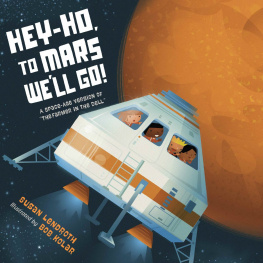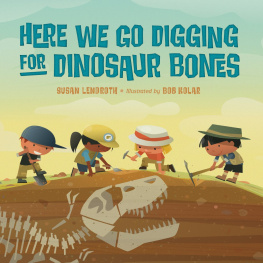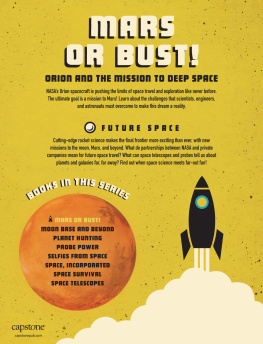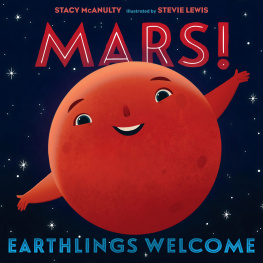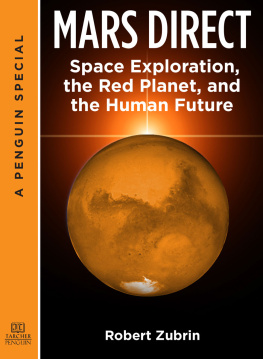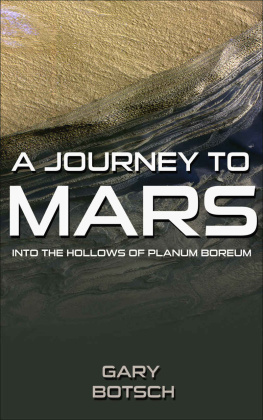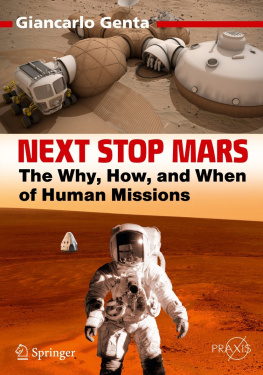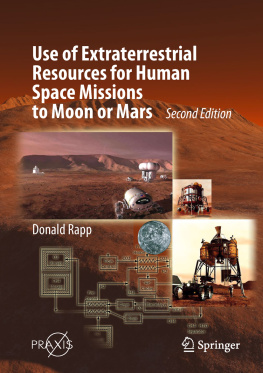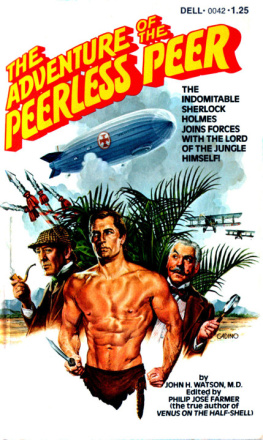The rockets on the pad,
The rockets on the pad,
Hey-ho, to Mars well go
The rockets on the pad.
When you jump up, gravity pulls you
back down. Launching a rocket into
space is hard because Earths gravity
is pulling the rocket in the opposite
direction. The bigger and heavier the
rocket, the more power you need to
break free.
We launch with a roar,
We launch with a roar,
Hey-ho, to Mars well go
We launch with a ROOOOOAR!
To travel to Mars you will need a spaceship big
enough to carry you and your crew, your food, your
water, and all of your supplies. Its easier to launch
such a big spaceship from orbit than from Earth.
You could build the spaceship in space, carrying up
one piece at a time on several trips. Once your Mars
spaceship is assembled, you will travel to it in a
smaller rocket.
There is no air to breathe in space. When
your rocket reaches the spaceship, the
two spacecraft will be locked together.
Then the doorsor hatcheswill open
to let you out of your rocket and into
the spaceship. That will keep air inside
the spacecraft.
Lets dive through the hatch,
Lets dive through the hatch,
Hey-ho, to Mars well go
Lets dive through the hatch.
Good-bye, planet Earth,
Good-bye, planet Earth,
Hey-ho, to Mars well go
Good-bye, planet Earth!
Using current rocket engines, a trip to
Mars would take about six months.
But engineers are trying to develop
new propulsion systems that might cut
that time in half. They are also
exploring ways to mimic gravity in a
spacecraft. With present-day
technology, you would not feel the
effect of gravity so far from a planets
surface. You would float!
Can you catch my sock?
Can you catch my sock?
Hey-ho, to Mars well go
Can you catch my sock?
Imagine what a mess you could make
without gravity. At home, if you leave
your toys on the floor, they stay where
you dropped them. But in space, anything
you dont put in a cupboard or fasten in
place will drift like dandelion fluff,
bouncing off walls and your crewmates.
I squirt myself clean,
I squirt myself clean,
Hey-ho, to Mars well go
I squirt myself clean.
Water floats, too, so forget about taking a
bath. You will squirt a little water and soap
from a pouch onto your skin, and then rub
yourself clean and dry with a towel. Make
sure you catch all the water!
We sleep on the walls,
We sleep on the walls,
Hey-ho, to Mars well go
We sleep on the walls.
When its time for bed, youll strap yourself into a
sleeping bag hung from the wall. You dont want to
float away in your sleep!
Our greens grow in bags,
Our greens grow in bags,
Hey-ho, to Mars well go
Our greens grow in bags.
For a trip to Mars, you will need to bring enough
food to last you at least two years. Most of
the food will be packaged on Earth, but you
can also grow fresh vegetables in bags or other
containers that hold nutrients and moisture
no dirt needed. Add special lamps that mimic
sunlight, and youre a space farmer.
Cycling keeps us strong,
Cycling keeps us strong,
Hey-ho, to Mars well go
Cycling keeps us strong.
On Earth, lifting your feet when you
walk or run helps make your bones
and muscles strong. In space,
without gravity constantly pulling on
you, those bones and muscles grow
weak. To keep fit, you will need to
exercise every day.
How long till were there?
How long till were there?
Hey-ho, to Mars well go
How long till were there?
On your journey to Mars, you wont be able
to go outside to play. But you can do many
of the things you might do on a rainy day at
home: watch movies, read, play games, or
daydream about the adventures to come.
After your long space voyage, you will arrive
at Mars. Although the gravity of Mars is
weaker than that of Earth, you will not land
your big spacecraft there. Instead, you will
leave your spacecraft in orbit and travel to
the surface in a lander.
Touchdown! Weve arrived.
Touchdown! Weve arrived.
Hey-ho, to Mars well go
Touchdown! Weve arrived.
Lock helmets into place,
Lock helmets into place,
Hey-ho, to Mars well go
Lock helmets into place.
The air on Mars is too thin for people to
breathe. You will have to carry your oxygen
with you in a spacesuit. You could also build
a base with special doors to keep breathable
air inside.
Have you ever looked at Mars in the night
sky? Its a reddish point of light, no brighter
than most of the stars. When youre millions
of miles away on Mars, Earth will look like a
small blue dot in the Martian sky.
The Earths a blue dot,
The Earths a blue dot,
Hey-ho, to Mars well go
The Earths a blue dot.
Come on, lets explore,
Come on, lets explore,
Hey-ho, to Mars well go
Come on, lets EXPLORE!
With a whole planet to explore, what will
you see first? Valles Marineris, a canyon
five times deeper than the Grand
Canyon? Olympus Mons, a volcano
nearly three times higher than the tallest
mountain on Earth? Astronauts visiting
Mars may stay as long as two years, so
you will have plenty of time to explore.
S ending astronauts to the Moon was hard; sending
people to Mars will be much harder. Between Earth and Mars lie
millions of miles of space. The orbits of the two planets move them closer
and farther apart during two-year cycles. The distance between them is never
less than 33 million miles and is usually far greater, up to 249 million miles. It took
astronauts three days to travel to the Moon, but journeys to Mars could take six months
each way.
The United States, Russia, Europe, Japan, and India have all sent unmanned, robotic spacecraft to
Mars. Some missions have succeeded in landing rovers to explore the Martian surface. Other spacecraft
have orbited the planet, sending back information that will one day help us plan human missions to Mars.
Before astronauts make the trip, scientists will need to develop the following:
A spacecraft that can carry humans to Mars and back on a two-year mission
Reliable methods to grow food in space
Equipment on Mars to create breathable air
A way to manufacture rocket fuel on Mars for the return tripor a propulsion method that
does not need large amounts of fuel
An environment that ensures the health of astronauts on a long mission
After Earth, Mars is the most habitable planet in our solar system. Learning more about our neighbor will
teach us more about how planets develop, how atmospheres form and change, and how life may survive on
different worlds. Of course, exploring Mars will also be a grand adventure. Do you want to go?
L earn more about Mars exploration:
Robotic Mars Exploration (NASA): http://www.nasa.gov/mars
Mars for Kids (NASA): http://mars.nasa.gov/participate/funzone/
Marsthe Red Planet (European Space Agency):
https://www.esa.int/esaKIDSen/SEM3L6WJD1E_OurUniverse_0.html
Note: Distances and sizes of objects in art are not to scale.
To Lu Coffing, whos definitely not a mundaneS. L.
For my exploring-the-world adventure friends, Mark, Jen, and LisaB. K.
Special thanks to David F. Doody, robotic-spaceflight engineer, author of Deep Space
Craft: An Overview of Interplanetary Flight, and publisher of Blroof Press, for reviewing

